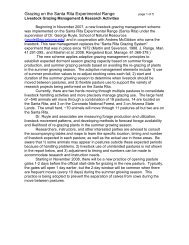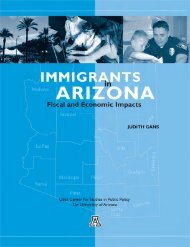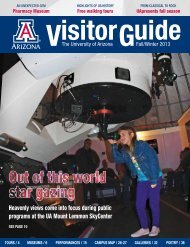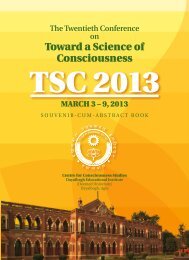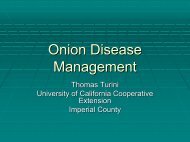CONSCIOUSNESS
Download - Center for Consciousness Studies - University of Arizona
Download - Center for Consciousness Studies - University of Arizona
- No tags were found...
Create successful ePaper yourself
Turn your PDF publications into a flip-book with our unique Google optimized e-Paper software.
1. Philosophy 67<br />
1995). One need not, however, give up entirely on objectivity: the data of subjective experience<br />
may reasonably be constrained by intersubjectivity (Hut & Shepard, 1996; Jack & Roepstorff,<br />
2003; Piccinini, 2003; Thompson, 2001; Zahavi, 2001), which expresses “properties<br />
that are inherent in subjective conscious experience, but in addition are mutually agreed upon<br />
by different subjects” (Hut & Shepard, 1996, p. 317). With this constraint, subjectivity is harnessed<br />
in the quest for intersubjective truth. We therefore may and should consider subjective<br />
experience as primary data for the science of consciousness, and our effort to construct such<br />
a science must include intersubjective data. This approach will eventually become the new<br />
science of consciousness when coupled with investigation of a particular class of experience,<br />
anomalous experiences. This class of experience lies outside of our understanding at present,<br />
hence the labeling as anomalous, and thus provides the most crucial test of theories of<br />
consciousness: can a theory explain what has previously been a mystery? The usefulness of<br />
this approach will be demonstrated using data from two types of anomalous experience: the<br />
near-death experience and after-death communications. Both of these phenomena have been<br />
dismissed by skeptics as hallucinations, wishful thinking or lies, even though both have been<br />
experienced and reported independently by millions of people across human history and the<br />
planet. Examples of each phenomenon will be provided to show that common characteristics<br />
are present in these independent reports, thus providing an intersubjective data set that must<br />
be explained for our understanding of consciousness to progress. P1<br />
55 Is a Science of Consciousness Possible? Limitations, Doubts and<br />
Opportunities William H Kautz (Former Director, Center for<br />
Applied Intuition, and President, Gaia Institute, Tucson, AZ)<br />
Before embarking on the creation of a scientific theory of consciousness we would do well<br />
to check the root assumptions on which all scientific knowledge and scientific methodology<br />
are based. This is not merely a formal precaution, because these assumptions have already<br />
been fundamentally violated by some of this last century’s strongest discoveries in particle<br />
physics, medicine and parapsychology, and to a lesser extent in some of the social sciences.<br />
We also know that some of these assumptions are only doubtfully satisfied for the study of<br />
consciousness in general, and one of them, objectivity, is not satisfied at all. If we cannot find<br />
a way to reformulate or circumvent these assumptions about our world, or to modify our methods<br />
so as to accommodate them as they stand, we are at risk of generating findings that are<br />
misleading, meaningless or downright wrong. This presentation discusses these unresolved<br />
issues and identifies some possible means for resolving them. The principal root assumptions<br />
up for reexamination are objectivity, measurability (positivity) and the aspects of causality<br />
and randomness inherent in reductionism. We present examples of prior studies in science<br />
in which all root assumptions were satisfied but the findings were meaningless, incorrect or<br />
directly challenged their own legitimacy. We then discuss how both the root assumptions and<br />
present-day scientific methodology might need to be changed in order to allow a depth study<br />
of consciousness. The nature of the failures just cited hints that such changes may not be possible<br />
at all, in which case entirely new assumptions and/or a new methodology may have to be<br />
created. We may be forced to turn to “other ways of knowing” than traditional science if we<br />
are ever to generate a foundation of solid, consensual knowledge about what consciousness is<br />
and how it works within the human mind. [300 words] P1<br />
56 We Will Know What We Are Looking For When We Find It Morey Kitzman<br />
(Psychology, Metropolitan State College of Denver, Littleton, CO)<br />
Thus far the field of consciousness research seems to lack any clear sense of what it is<br />
exactly that we researching. We have no consensus to either describe or define consciousness<br />
and a great many question the very idea of consciousness. Operational definitions have<br />
been completely absent. Perhaps the question we should be asking is not what is the nature<br />
of consciousness, but instead why are we in such a state of confusion about something that<br />
should be patently self evident. In other words, I am I, and should not the I of I am know itself.<br />
Should not that which is conscious have some understanding directly of its consciousness?



